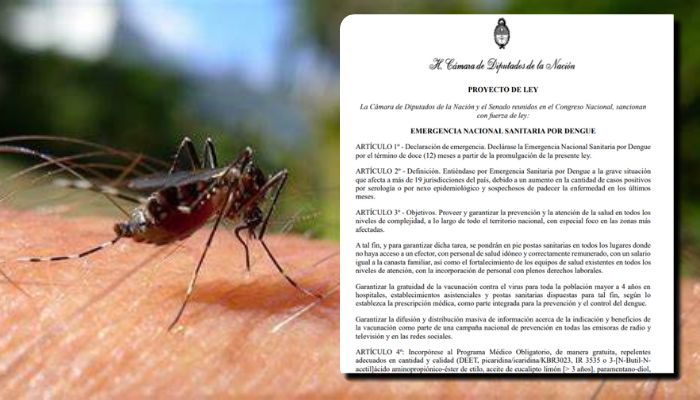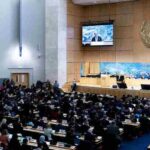
In 2023, in the midst of an escalating epidemic, the national deputy for the province of Jujuy, Alejandro Vilca, presented a bill that proposed declaring a Health Emergency due to dengue at the national level. The initiative established a series of immediate and comprehensive implementation measures, prevention and care for the working class and the community, in addition to the improvement of housing conditions and the health system. However, the then ruling Frente de Todos and alliances such as Libertad Avanza and Juntos por el Cambio, They refused to allow Congress to treat the FITU project on tables, within the framework of a session that took place in the month of April. The treatment proposal “on boards”which Deputy Vilca had made, had to do precisely with the seriousness of the situation, which was already reaching epidemic levels, as well as with the lack of treatment of the project in the commissions to which it had been referred at that time.
This weekin the context of an even greater crisis than the one registered in that April 2023, the Jujuy deputy re-entered the project together to his benchmates, Nicolás del Caño, Myriam Bregman, Christian Castillo and Romina del Plá. “They are already more than 19 jurisdictions those that register alarming increases in the number of positive cases, which also already surpass the epidemic experienced in 2023, when our project entered for the first time”recalls Vilca.
Today, while the dengue epidemic continues to grow to levels never seen in the country’s history, the national and provincial governments continue to look the other way. “Urgent and coordinated actions are needed to contain the spread of the disease, to provide adequate care to the affected people and territories and to prevent new infections,” says Alejandro Vilca.
What does the project on the left propose?
The project re-entered this week demands that prevention and care for the affected population be guaranteed through the strengthening health teams at all levels care: primary, secondary and tertiary. It also establishes the creation of the health posts, with trained health personnel and a salary equal to the family basket, wherever necessary, that is, the health system is adapted to the needs of the population and responds to demand, which due to the increase in infections It continues to grow and collapses existing institutions, already battered. “It is the responsibility of the State to guarantee that these health posts are present in all neighborhoods,” Vilca emphasized.
Another notable aspect of the project is that proposes that vaccination be guaranteed free of charge for the population over 4 years of age in hospitals, healthcare establishments and health posts, as well as the dissemination and mass distribution of information on the indications and benefits of vaccination, as part of a national prevention campaign which must be broadcast on all radio and television stations, in print media and on social networks, if the law is approved.
The initiative that is still awaiting its transfer to Commissions, for its treatment, also proposes that medicines, supplies, equipment for health centers and that drinking water and repellent be massively provided to all neighborhoods and reference institutions.
“It cannot be that a vaccine, or even such a basic and indispensable element to prevent contagion, such as a repellent, continue to be the object of business speculation,” says Vilca, and highlights that, If this project is approved, these elements must be distributed “free, public and massive” in hospitals, wards and health centers, as well as in educational institutions and workplaces.. In addition, he points out that the project also aims to protect the labor rightssince it prohibits dismissals or any modification of the employment relationship in the case of employees who suffer or suspect they suffer from the disease and have not received a medical discharge.
It also proposes that weekly surveys be carried out, removing debris, intra- and peri-home fumigations, periodic controls and elimination of new mosquito breeding sites, among several others. minimum, basic measures that are required to address this health emergency. “These are all issues that the national State and the provincial and municipal States should already be guaranteeing,” said the Jujuy collection worker and current national deputy.
Prepared with contributions from social organizations in the most affected localities, as well as numerous health workers, the project on the left reveals that far from individual responsibility, the alarming increase in dengue cases It is directly related to climate change and to the methods of exploitation of the soil and the ecosystem..
“It is not a coincidence, for example, that the areas where there are the greatest number of dengue cases are the areas most affected by agribusiness,” emphasizes Vilca, and emphasizes that while businessmen amass fortunes and millions are allocated to paying the debt with the IMF, those mainly affected, those who die from this preventable disease or suffer serious consequences on their health, are the popular sectors, the working people, the residents of flood-prone neighborhoods, rural towns, slum neighborhoods resources, the vast majority of whom have lived for decades without access to drinking water, sewers and other conditions that facilitate the spread of dengue. “To end dengue we must make visible and end its structural causes,” the left-wing deputy emphasizes in this regard.
Finally, the initiative proposes the creation of a Monitoring Committee for all these actions, independent of the governments in power and confirmed by neighbors, workers and specialists, and a special budget item for compliance with everything provided in the law.
PDL_National Emergency By… by Sol Bajar
Source: www.laizquierdadiario.com

